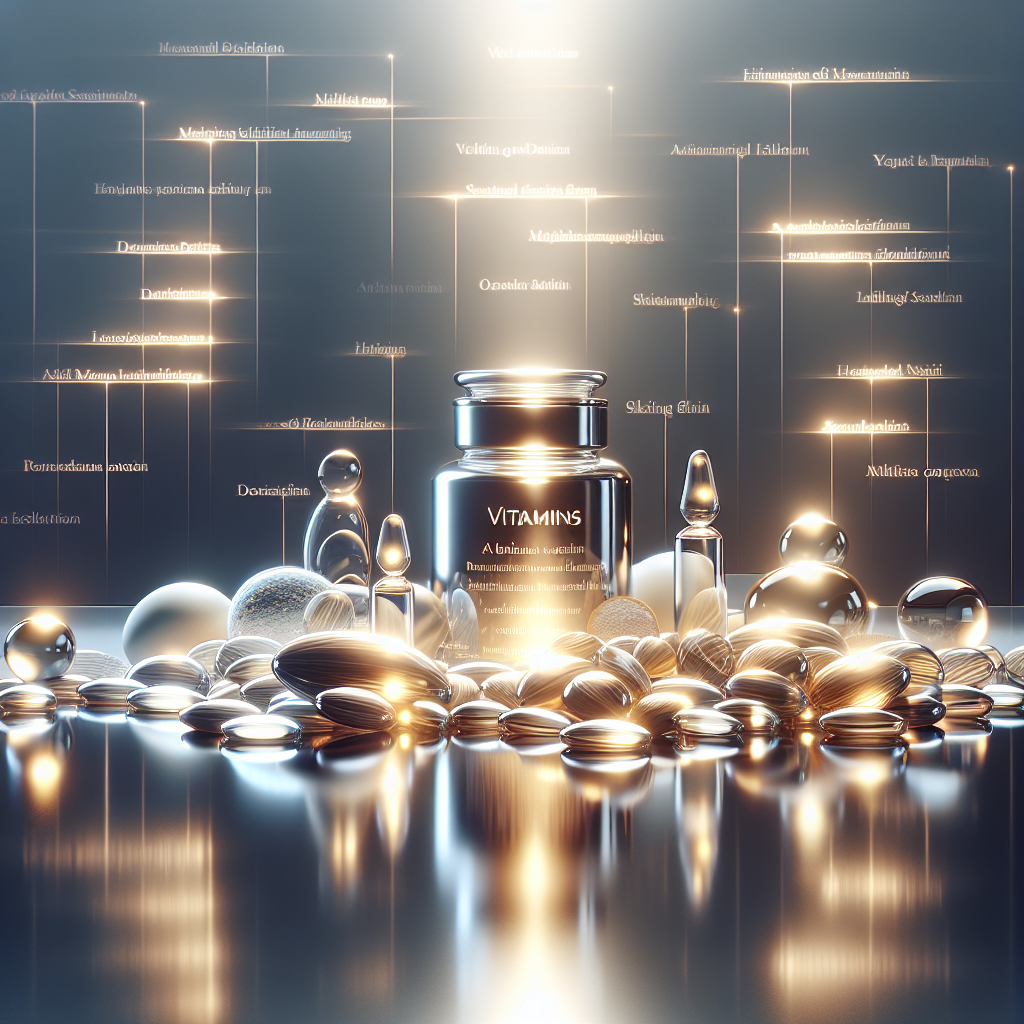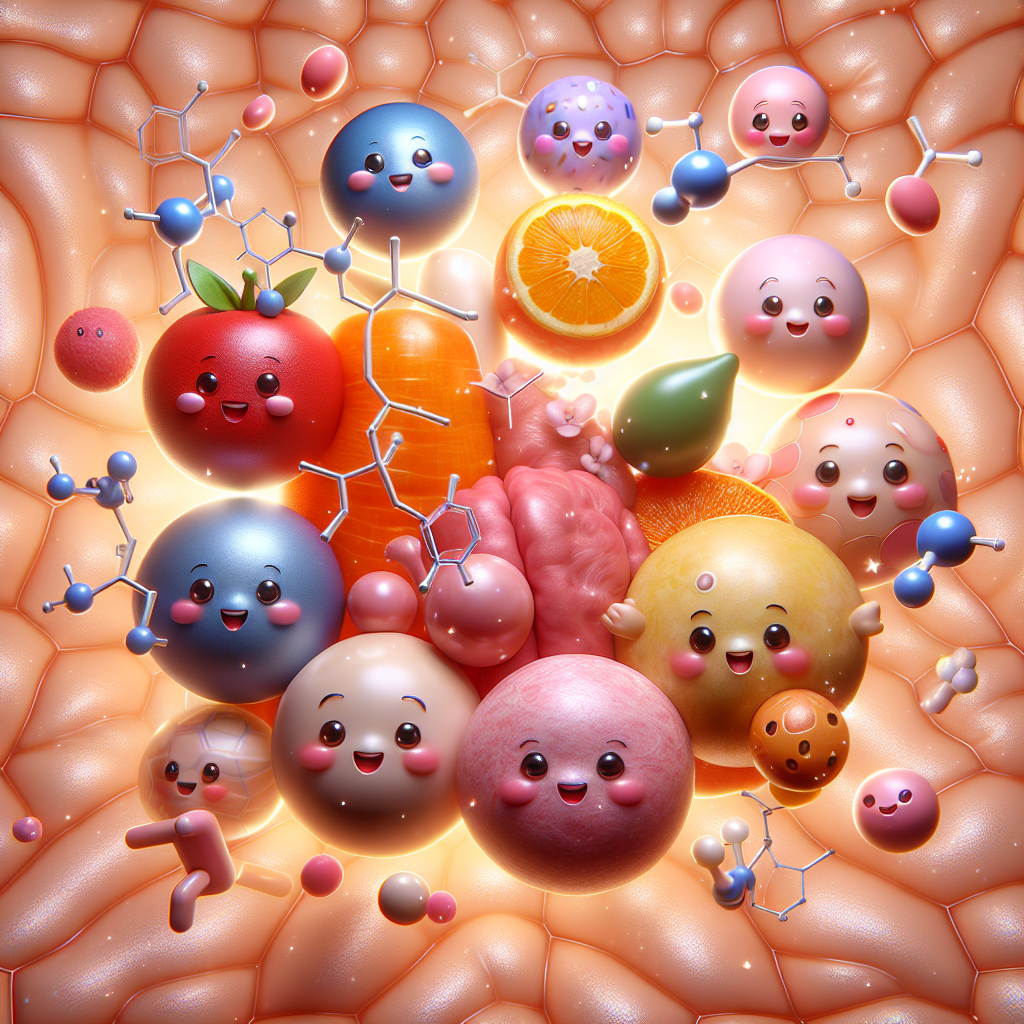Vitamins That Keep Skin Looking Youthful

Discover the secret to youthful-looking skin with our range of vitamins. Don’t wait, rejuvenate your skin today! Click here to explore our products.
Essential Vitamins for Maintaining Youthful Skin
The quest for youthful, radiant skin is a universal pursuit that transcends age, gender, and culture. While many turn to expensive creams, serums, and other topical treatments, the secret to maintaining a youthful complexion may lie in something as simple as the vitamins we consume. Indeed, certain vitamins play a crucial role in skin health, contributing to its elasticity, glow, and overall appearance.
Vitamin A, for instance, is a potent antioxidant that aids in the repair and maintenance of the skin. It promotes the production of healthy skin cells, reducing the appearance of fine lines and wrinkles. This vitamin is found in foods such as carrots, sweet potatoes, and spinach. However, it can also be taken as a supplement or applied topically in the form of retinol, a derivative of vitamin A that is widely recognized for its anti-aging properties.
Next on the list is vitamin C, often hailed as a ‘skin savior’. This vitamin is essential for the production of collagen, a protein that gives skin its firmness and elasticity. As we age, our collagen production naturally decreases, leading to sagging skin and wrinkles. By boosting collagen production, vitamin C helps to maintain the skin’s youthful firmness. Moreover, it also acts as a powerful antioxidant, protecting the skin from damage caused by free radicals and exposure to the sun’s harmful UV rays. Citrus fruits, strawberries, and bell peppers are excellent sources of vitamin C.
Vitamin E is another antioxidant that is vital for skin health. It helps to protect the skin from damage caused by free radicals and environmental stressors such as pollution and UV radiation. Vitamin E also has moisturizing properties, helping to keep the skin hydrated and preventing dryness and flaking. Foods rich in vitamin E include nuts, seeds, and leafy green vegetables.
Vitamin K is less well-known but equally important for maintaining youthful skin. It plays a key role in the body’s blood clotting process, which helps to heal wounds and bruises. In terms of skin health, vitamin K can help to reduce dark circles under the eyes and minimize the appearance of spider veins. It can be found in foods like kale, spinach, and broccoli.
Lastly, the B vitamins, particularly B3 (niacin) and B5 (pantothenic acid), are essential for skin health. They help to retain moisture, reduce redness and irritation, and improve the skin’s elasticity. B vitamins can be found in a wide range of foods, including whole grains, meat, eggs, and dairy products.
In conclusion, while topical treatments can certainly help to improve the appearance of our skin, it’s equally important to nourish our skin from within. By incorporating foods rich in these essential vitamins into our diet, we can help to maintain our skin’s youthful glow and delay the signs of aging. However, it’s important to remember that everyone’s skin is different, and what works for one person may not work for another. Therefore, it’s always a good idea to consult with a healthcare professional or a dermatologist before making any major changes to your diet or skincare routine.
The Role of Vitamins in Skin Anti-Aging

The quest for youthful, radiant skin is a universal pursuit that transcends cultures and generations. While many factors contribute to the health and appearance of our skin, one aspect that often goes overlooked is the role of vitamins. Vitamins, both consumed through diet and applied topically, play a crucial role in maintaining the skin’s youthful appearance and slowing down the aging process.
Vitamin A, also known as retinol, is one of the most potent anti-aging vitamins. It stimulates the production of new skin cells, helping to reduce the appearance of fine lines and wrinkles. It also aids in the repair of damaged skin, making it an essential component in the fight against sun damage and other environmental stressors. Foods rich in vitamin A include sweet potatoes, carrots, and dark leafy greens. Topical retinol products are also widely available and can be incorporated into your nightly skincare routine.
Vitamin C is another powerhouse in the realm of skin health. Known for its antioxidant properties, vitamin C helps to neutralize harmful free radicals that can accelerate the aging process. It also plays a vital role in collagen synthesis, which is key to maintaining skin’s elasticity and firmness. Citrus fruits, strawberries, and bell peppers are excellent sources of vitamin C. Additionally, many skincare products contain vitamin C, which can be applied directly to the skin for maximum benefits.
Vitamin E, like vitamin C, is a powerful antioxidant that protects the skin from environmental damage. It also has moisturizing properties, helping to keep the skin hydrated and plump, which can reduce the appearance of fine lines and wrinkles. Foods high in vitamin E include nuts, seeds, and spinach. Vitamin E oil can also be applied topically, either on its own or mixed with your favorite moisturizer.
Vitamin B3, also known as niacinamide, is another key player in skin health. It helps to improve the skin’s barrier function, which can help to lock in moisture and protect the skin from environmental irritants. It also has anti-inflammatory properties, which can help to soothe redness and irritation. Foods rich in vitamin B3 include chicken, tuna, and lentils. Niacinamide is also a common ingredient in many skincare products, including serums and moisturizers.
Lastly, vitamin K is known for its ability to improve the appearance of dark circles and bruising, making it a key ingredient in many eye creams. It helps to improve blood coagulation, which can reduce the appearance of veins and capillaries under the skin. Foods high in vitamin K include kale, spinach, and broccoli.
In conclusion, vitamins play a crucial role in maintaining youthful, healthy skin. Incorporating foods rich in these vitamins into your diet, along with using skincare products that contain them, can help to slow down the aging process and keep your skin looking its best. However, it’s important to remember that while vitamins are essential, they are just one piece of the puzzle. A balanced diet, regular exercise, adequate sleep, and proper hydration are all equally important in maintaining healthy, youthful skin.
Top Vitamins to Incorporate for a Youthful Skin Glow
The quest for youthful, glowing skin is a universal pursuit that transcends age, gender, and culture. While topical skincare products and treatments play a significant role in maintaining skin health, the importance of a balanced diet, rich in essential vitamins, cannot be overstated. This article will delve into the top vitamins that can help keep your skin looking youthful and radiant.
Vitamin A, often found in foods like sweet potatoes, carrots, and spinach, is a potent antioxidant that aids in the repair and maintenance of skin cells. It promotes the production of healthy skin cells, replacing the old, damaged ones, thereby reducing the appearance of fine lines and wrinkles. Moreover, it helps to protect the skin against harmful UV radiation and slow down the aging process.
Next on the list is Vitamin C, a powerhouse nutrient that is crucial for skin health. It is a potent antioxidant that neutralizes harmful free radicals, which can cause oxidative stress and lead to premature skin aging. Vitamin C also plays a vital role in collagen synthesis, a protein responsible for skin elasticity and firmness. Citrus fruits, strawberries, and bell peppers are excellent sources of this essential vitamin.
Vitamin E, another antioxidant, works in tandem with Vitamin C to protect the skin from sun damage. It helps to keep the skin hydrated, reducing dryness and flakiness, and promotes an even skin tone. Foods rich in Vitamin E include nuts, seeds, and leafy green vegetables.
Vitamin B3, also known as niacinamide, is gaining popularity in the skincare world for its multiple benefits. It helps to improve the skin’s barrier function, keeping it hydrated and reducing water loss. It also has anti-inflammatory properties, which can help soothe redness and irritation. Foods like chicken, tuna, and mushrooms are rich in Vitamin B3.
Vitamin K is another essential nutrient for skin health. It plays a crucial role in the body’s blood clotting process, which can help heal wounds and bruises. It can also help reduce dark circles under the eyes by improving blood circulation. Green leafy vegetables, broccoli, and Brussels sprouts are good sources of Vitamin K.
Lastly, Vitamin D, often referred to as the ‘sunshine vitamin,’ is essential for skin health. It helps to fight inflammation and can aid in the treatment of skin conditions like psoriasis and acne. The body can produce Vitamin D naturally when exposed to sunlight. However, it can also be obtained from foods like fatty fish, cheese, and egg yolks.
In conclusion, a balanced diet rich in these essential vitamins can significantly contribute to maintaining youthful, glowing skin. However, it’s important to remember that while vitamins are crucial, they are just one piece of the puzzle. A holistic approach to skincare, which includes a balanced diet, regular exercise, adequate sleep, and proper hydration, is the key to achieving and maintaining healthy skin. Always consult with a healthcare professional or a dermatologist before making any significant changes to your diet or skincare routine.